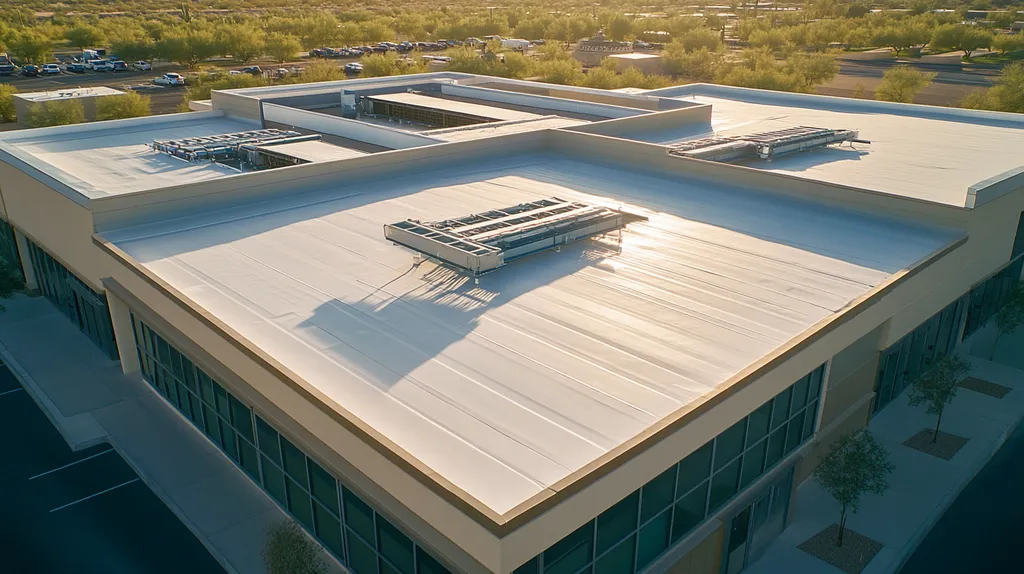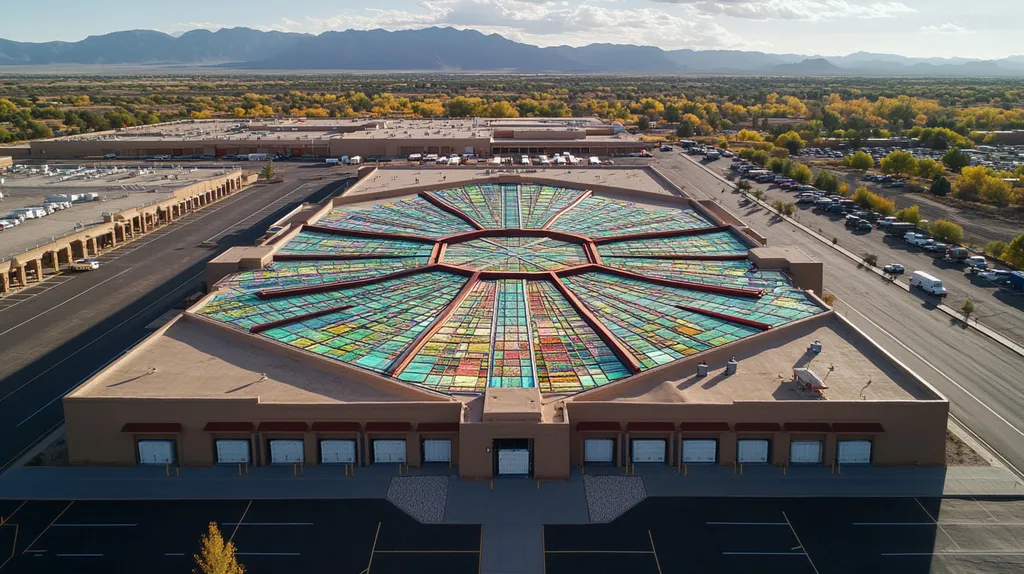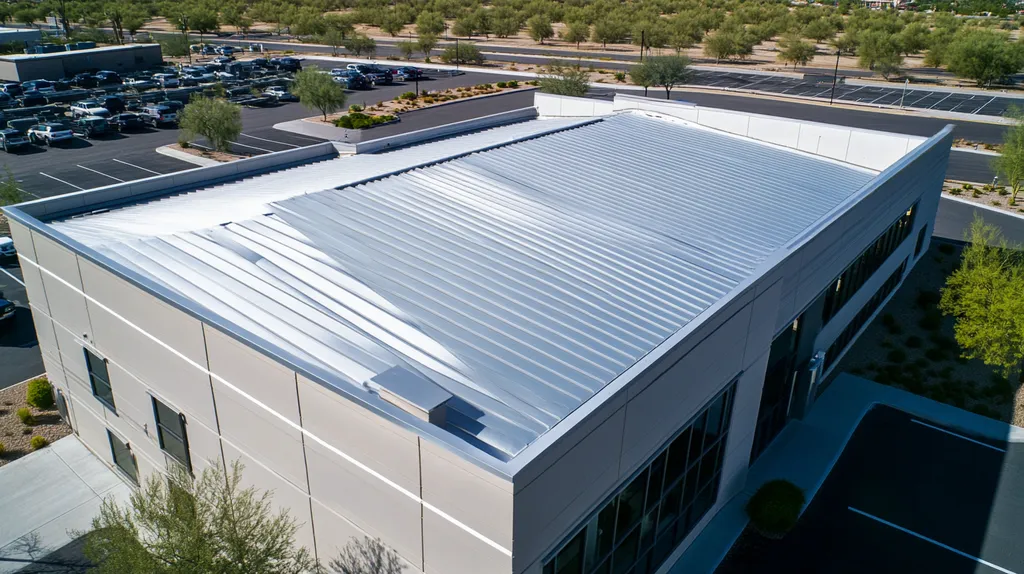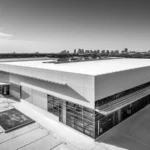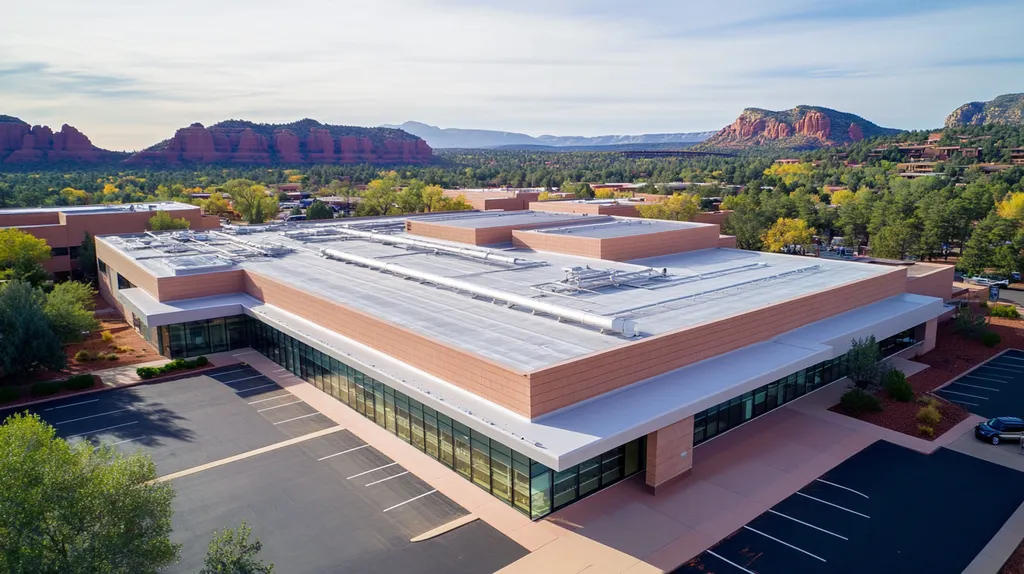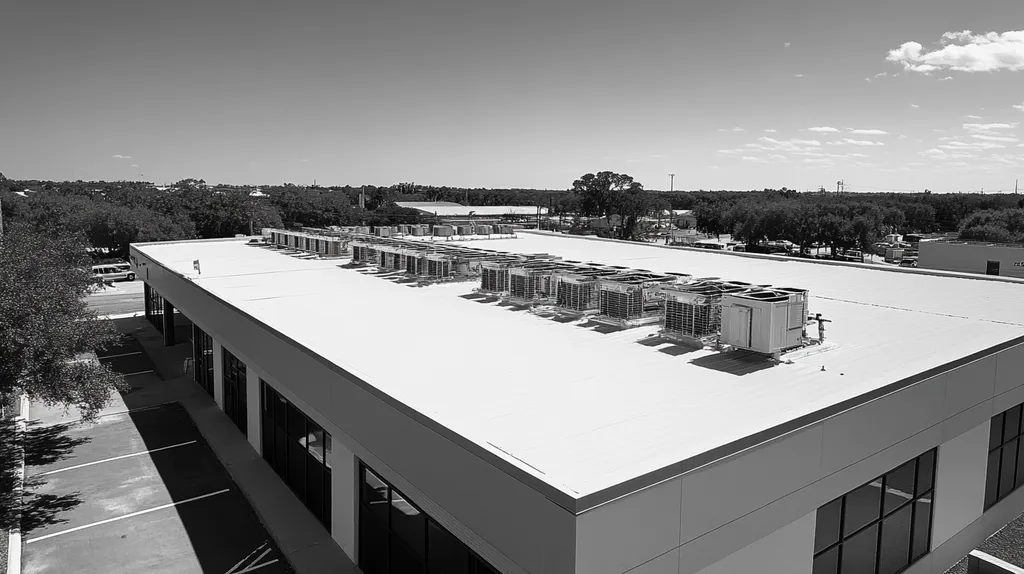In commercial roofing, the cost of hiring uncertified contractors extends far beyond immediate financial losses. Industry data reveals that improper installations reduce roof lifespans by up to 50%, while increasing maintenance costs by 30% over a decade.
Despite these stark statistics, many property owners and facility managers continue to overlook the critical importance of contractor certifications when selecting roofing professionals.
This comprehensive analysis examines the myths surrounding contractor certifications, their practical implications, and evidence-based solutions that protect commercial roofing investments.
SECTION 1: COMMON MISCONCEPTIONS
Misunderstandings about contractor certifications in commercial roofing can lead to significant financial setbacks for property owners and facility managers. The National Roofing Contractors Association highlights that improper installation can cut a roof’s lifespan by up to 50%. Recognizing the importance of certifications is vital for ensuring high-quality workmanship and dependable roofing solutions. This section examines three prevalent myths that can compromise roofing projects.
Certification is Not Necessary
A widespread misconception within the roofing industry suggests that certification is not crucial. Many property owners mistakenly believe that experience alone guarantees quality work, failing to acknowledge that certifications are essential for meeting industry standards. Without these credentials, contractors may lack familiarity with the most current techniques and technologies.
For example, roof coatings are rapidly evolving, and professionals who are certified in these products possess the specific application methods that enhance durability and energy efficiency. Hiring a contractor with the appropriate certifications helps minimize risks associated with compliance and performance.
Moreover, certified contractors typically gain access to superior materials and warranties. This access can translate to better long-term investments for property owners. Prioritizing contractor certification can have a significant impact on the longevity and efficiency of roofing systems.
Failing to verify a contractor’s certifications can expose property owners to legal liabilities if building codes are ignored. Inadequate adherence to regulations may leave property owners facing costly rework and potential safety violations.
Any Training is Sufficient
Another common misunderstanding is that any form of training qualifies a contractor to manage complex commercial roofing projects. While training is indeed important, not all programs provide equivalent value. Many roofing systems demand specialized knowledge that general training simply cannot offer.
For instance, installing reflective roof coatings requires an understanding of thermal dynamics and substrate compatibility. Certified training programs, such as those endorsed by roof coating manufacturers, equip contractors with the critical insights needed for successful installations, whereas generic training often falls short.
Furthermore, as regulations and best practices continue to evolve, contractors who engage in specialized training programs will be better prepared to adapt. This adaptability translates to safer and more effective roofing solutions.
Property owners who assume that any training is adequate may unknowingly set themselves up for potential project failures. In an increasingly competitive landscape, expertise derived from appropriate training is vital for achieving quality outcomes.
Experience Alone is Enough
Many individuals mistakenly believe that years of experience alone qualify a contractor for commercial roofing tasks. While experience certainly holds value, it cannot substitute for formal certification and specialized knowledge. Relying solely on past experience can result in critical oversights regarding application techniques and materials.
For example, a contractor with extensive experience may be working with outdated knowledge about the latest roofing materials or industry advancements. Certification ensures that contractors remain informed about emerging technologies and best practices, greatly influencing the outcomes of their projects.
Additionally, experience devoid of certification can result in compatibility issues with modern roofing systems. These challenges may culminate in roof failures, leading to costly repairs and diminished property value.
Property owners should consider both a contractor’s experience and their certifications when making evaluations. By neglecting this crucial step, they risk investing in subpar workmanship that could result in significant long-term expenses.
SECTION 2: PRACTICAL IMPLICATIONS
Understanding the implications of contractor certifications is essential for commercial property owners. The choice of a roofing contractor is not just a matter of preference; it can significantly affect the roof’s durability and ultimately the integrity of the entire building. Alarmingly, only 5% of consumers recognize that certified contractors offer superior products, revealing a substantial disconnect between perception and reality. This section delves into how certifications impact roof durability, maintenance costs, and the trust clients place in their contractors.
Impact on Roof Durability
Roof durability is paramount in the commercial sector, where financial stakes are high. Certified contractors adhere to rigorous industry standards, which ensures that roofing materials function at their best. Research indicates that certified roof coating installations can last up to 20% longer than those executed by uncertified contractors.
By opting for certified professionals, property owners can significantly reduce both the frequency and severity of roof-related issues. With proper installation, roofs can effectively withstand harsh weather conditions and minimize damage from debris, which reduces the likelihood of leaks and structural failures over time.
Additionally, many manufacturers extend warranties for roofs installed by certified contractors, offering further financial protection. These warranties can lead to considerable savings on replacement costs, providing property owners with peace of mind.
In summary, engaging a certified contractor not only enhances the roof’s lifespan but also improves the overall value of the property. Recognizing these durability advantages can guide property owners toward wiser roofing choices.
Effects on Maintenance Costs
Maintenance costs are a critical component of any roofing budget, and contractor certifications play a vital role in managing these expenses. Certified contractors are well-versed in advanced techniques that not only extend roof life but also reduce the frequency of maintenance needs. For instance, a well-applied roof coating can lower maintenance costs by as much as 30% over ten years.
Conversely, poor workmanship resulting from unqualified contractors often leads to a cycle of frequent repairs, significantly inflating long-term costs. The adherence to high standards by certified contractors ensures that roofs experience less premature wear and tear.
Implementing a preventive maintenance program with a certified contractor can also greatly benefit a roof’s overall longevity. Regular inspections and timely interventions help avoid expensive repairs that stem from negligence or oversight. This proactive approach translates to reduced expenses for property managers.
Working with certified contractors also allows property owners to budget more accurately for maintenance. When the job is done right from the beginning, there are fewer unexpected costs and less uncertainty ahead.
Influence on Client Trust
Client trust is built on reliability and the perceived quality of service. Roofing certifications underscore a contractor’s expertise, enhancing client confidence in their ability to deliver. Surveys show that 78% of businesses prefer certified contractors due to the assurance of quality and compliance with established industry standards.
In the commercial sector, trust matters greatly, as relationships can significantly impact outcomes. When property managers can confidently recommend a contractor based on certification, it engenders a sense of security and partnership with clients.
Evidence suggests that certified contractors often receive more favorable online reviews, contributing to a stronger marketplace reputation. This positive public perception can lead to increased business opportunities and higher rates of recommendations.
Ultimately, certification lays the groundwork for trust between contractors and clients. As the roofing industry continues to evolve, knowledge of certifications empowers property owners to make well-informed and confident decisions.
SECTION 3: COST OF MISINFORMATION
The financial risks associated with misinformation in the commercial roofing industry cannot be overstated. Studies indicate that property owners may incur repair expenses that exceed 30% of their annual maintenance budgets due to poorly executed roofing work. When contractors lack proper certifications, the likelihood of these costly outcomes increases significantly. Property owners must grasp the financial implications, potential missed business opportunities, and heightened liability risks that arise from misinformation in contractor qualifications.
Financial Consequences of Non-Certified Work
Hiring non-certified contractors can lead to severe financial repercussions. These contractors often lack the necessary training and may resort to cost-saving shortcuts that undermine the integrity of roofing systems. This can result in premature roof failures, pushing repair costs to escalate quickly.
Furthermore, property owners may discover that insurers refuse to cover damages linked to unqualified labor. As a result, property owners might find themselves facing thousands of dollars in unexpected expenses due to inadequate certification among their contractors.
A report from the National Roofing Contractors Association highlights that poorly executed work can diminish a property’s overall value, creating long-term financial challenges. The likelihood of requiring rework further exacerbates costs, an issue that certified professionals can often mitigate.
Ultimately, misinformation does not merely translate to direct financial losses but also erodes trust in the commercial roofing industry, complicating future project decisions.
Loss of Business Opportunities
In a competitive commercial roofing market, reputation is paramount. Contractors without recognized certifications often struggle to secure project bids. Property owners are increasingly averse to hiring contractors who cannot demonstrate proven credentials.
This skepticism can lead to missed business opportunities. For instance, a facility manager may choose a certified contractor with higher fees over an uncertified one offering a lower price, as the risks associated with unqualified work overshadow potential savings.
Moreover, large commercial contracts frequently mandate certified contractors to ensure compliance with industry standards. Failing to obtain necessary certifications not only limits immediate job prospects but also stunts future growth opportunities for contractors.
Consequently, the absence of certified expertise can hinder not only current business prospects but also the long-term sustainability of contractors in the market.
Increased Liability Risks
The lack of certifications significantly amplifies liability risks. Contractors who do not possess the necessary qualifications may overlook crucial safety and compliance standards, leading to hazardous roofing conditions that jeopardize the safety of both workers and building occupants.
In events of accidents or failures, liability may shift back to property owners, exposing them to costly legal proceedings. Additionally, many insurers may decline coverage for claims associated with unqualified work, placing financial burdens squarely on property managers.
Many manufacturers’ warranties also stipulate that installations must be conducted by certified professionals. If failures occur, property owners could find themselves without recourse for necessary repairs or reimbursements.
Thus, prioritizing certified work becomes vital in mitigating liability risks and ensuring compliance with warranty stipulations.
SECTION 4: REALITY CHECK
Grasping the significance of certifications in the commercial roofing field is not merely an academic exercise; it is a critical necessity. With a staggering 75% of roofing failures attributed to improper installation, the stakes are high for property owners. Manufacturer-specific certifications, endorsements from industry associations, and specialized training programs emerge as vital tools in safeguarding investments. This section will dissect the implications of these certifications and clarify their essential roles in promoting quality and reliability within the roofing sector.
Importance of Manufacturer-Specific Certifications
Manufacturer-specific certifications provide assurance that contractors are trained to install products according to the strict guidelines laid out by the manufacturer. This specialization is crucial because each roof coating demands specific application techniques; failure to adhere to these guidelines can lead to significant and costly installation failures.
Roofing systems vary significantly in terms of their chemical makeup and installation protocols. Even a slight deviation from manufacturer’s instructions can jeopardize the entire system, resulting in premature failures. Therefore, property owners should prioritize hiring certified contractors to protect their investments effectively.
Moreover, many manufacturers issue warranties contingent on proper installation. Engaging non-certified contractors can nullify these warranties, leaving property owners responsible for future repair costs. Thus, manufacturer certifications are not just beneficial; they are essential safeguards against unforeseen expenses.
By hiring certified contractors, property owners can not only enhance the likelihood of successful installations but also reduce long-term costs associated with roofing failures.
Role of Industry Associations in Certification
Industry associations hold a pivotal role in establishing standards and benchmarks for roofing contractors. Organizations like the National Roofing Contractors Association (NRCA) offer certification programs that ensure contractors meet specific quality and performance metrics. These programs enhance professionalism within the industry, elevating overall service expectations.
Certifications from credible associations signify that contractors commit to adhering to best practices and upholding rigorous standards. Property owners can thus have greater confidence in selecting certified professionals for their roofing needs.
Additionally, membership in industry associations usually encourages ongoing education, enabling contractors to stay updated on the latest technologies, materials, and industry practices. This commitment to continuous improvement ultimately benefits property owners by providing access to cutting-edge solutions.
Recognizing the significance of these industry associations can guide property owners toward informed and strategic decisions when selecting contractors for roofing projects.
Benefits of Specialized Training Programs
Specialized training programs are crucial in preparing contractors to meet contemporary roofing challenges. These programs encompass a wide array of topics, including application techniques, safety protocols, and advancements in material science. This comprehensive curriculum contributes to more effective installations and minimizes the risk of errors.
Contractors who undergo specialized training emerge better equipped to tackle unique project demands, resulting in enhanced quality of work. These programs also place a strong emphasis on compliance with local building codes and regulations, ensuring that installations are conducted within legal frameworks.
Importantly, the hands-on experience often included in these training programs allows contractors to sharpen their practical skills. This real-world application is invaluable when managing roofing issues that arise during installation or maintenance.
A skilled workforce results in fewer mistakes and higher client satisfaction rates, making specialized training indispensable for contractors aiming to maintain a competitive edge in the market.
SECTION 5: EVIDENCE-BASED ALTERNATIVES
As the commercial roofing industry continues to evolve, the significance of contractor certifications becomes increasingly apparent. Property owners and facility managers face considerable risks when engaging unverified contractors, such as costly overruns and faulty installations. In fact, studies indicate that nearly 30% of roofing failures result from inadequate workmanship over time. Understanding evidence-based alternatives can empower stakeholders to make informed decisions regarding contractor selection.
Certified Applicator Training Programs
Certified applicator training programs provide contractors with essential skills for executing high-quality installations. These structured programs encompass vital topics such as surface preparation, coating application techniques, and safety protocols.
The certification process typically includes both classroom instruction and hands-on training, ensuring contractors are well-versed in coating materials and application equipment. This comprehensive approach standardizes practices, leading to improved job quality and a decreased likelihood of future issues.
Participants gain access to industry best practices that align with manufacturer specifications, ensuring optimal performance and durability of coatings. By selecting contractors who have completed these training programs, property owners can confidently invest in roofing systems designed for long-term success.
Industry-Recognized Certification Standards
Industry-recognized certification standards establish the benchmarks that contractors must meet to effectively serve specific markets. Organizations such as the National Roofing Contractors Association (NRCA) and the Roofing Industry Alliance for Progress have established these standards to enhance quality control across the sector.
Contractors who comply with these standards exemplify a dedication to professionalism and continuous education, resulting in improved safety practices that reduce liability for property owners.
These standards offer a straightforward method to evaluate contractor qualifications. Property owners who choose certified contractors can rest assured they are selecting from a pool of professionals committed to delivering high-quality workmanship.
In addition, certified contractors often enjoy enhanced access to industry innovations and cutting-edge materials, allowing for advanced solutions that improve the durability and energy efficiency of roofing systems.
Case Studies of Certified Contractors
Case studies of certified contractors underscore the tangible advantages of collaborating with trained professionals for commercial roofing projects. In many documented cases, certified contractors have achieved up to a 20% reduction in material waste due to their refined application techniques.
One notable example features a certified contractor who applied a roof coating to a large industrial facility. This effort resulted in significant thermal efficiency improvements, subsequently lowering energy costs for the property owner.
Furthermore, case studies reveal that roofs installed by certified professionals typically demonstrate extended service lives, reducing the need for frequent repairs and replacements.
By examining these successful outcomes, property owners and facility managers can appreciate the value of partnering with certified contractors. Such evidence captivates the case for prioritizing evidence-based alternatives when selecting contractors for roofing endeavors.
SECTION 6: TEST AND VERIFY
In the high-stakes realm of commercial roofing, the long-term value and performance of a property hinge on the quality of its roof. Alarmingly, studies reveal that nearly 50% of roofing failures stem from poor workmanship. Consequently, regularly verifying certifications and conducting thorough inspections are vital practices to ensure a roof’s durability and effectiveness. This section elaborates on the importance of robust inspection protocols, the necessity of confirming contractor credentials, and strategies for evaluating workmanship quality effectively.
Conducting Regular Inspections
Regular inspections are indispensable for preserving the integrity of commercial roofs. These periodic assessments help identify potential issues before they escalate into significant and costly repairs. Property owners should prioritize scheduling inspections at least twice a year, particularly in advance of and following extreme weather conditions.
Utilizing trained professionals for these inspections assures that every detail is meticulously examined. Advanced tools such as infrared thermography, moisture surveys, and drone technology can identify hidden problems that are not visible during a standard visual assessment.
Documentation of inspection findings is equally critical. Maintaining a comprehensive record facilitates tracking the roof’s condition over time and informs decisions regarding repairs, renovations, or full replacements.
By implementing proactive inspections, property owners can significantly extend the lifespan of their roofs while protecting their investments. Early detection of issues can lead to significant savings in repair costs and contribute to a safer environment.
Verifying Certification Credentials
Verifying the certification credentials of roofing contractors is an essential step in the selection process. Certifications are indicative of a contractor’s adherence to industry standards and specialized training. This verification process is critical in minimizing the risks associated with hiring unqualified personnel.
Property owners should request copies of contractors’ certifications and reach out to the issuing organizations for verification. This confirms that contractors not only claim certifications but also meet the necessary skills and knowledge prerequisites.
It is also prudent to check for any affiliations with respected industry organizations. Membership in professional groups typically requires adherence to a code of ethics and ongoing education, reflecting a contractor’s commitment to quality and safety.
Neglecting to verify credentials can lead to substandard work, resulting in unforeseen repair costs or liability issues. When property owners prioritize verifying certifications, they empower themselves to make informed decisions that protect their investments.
Evaluating Workmanship Quality
The quality of workmanship directly influences the overall performance of a commercial roof. Reviewing a contractor’s previous projects is invaluable for assessing their skill level and reliability. Property owners should actively seek references and images of completed work to inform their decisions.
A reputable contractor will willingly provide a portfolio showcasing past projects. Comparing these against industry standards allows for an assessment of whether a contractor consistently delivers high-quality results. Attention to detail and thoroughness are key indicators of competent workmanship.
Furthermore, effective communication throughout the roofing process often reflects the quality of workmanship. A contractor’s responsiveness to queries and concerns can correlate with their commitment to maintaining professional standards. Clear communication can help foster a smoother project experience.
Post-project inspections can offer immediate feedback on workmanship quality. Regularly assessing newly completed roofs will enable property owners to confirm that the work meets or exceeds established expectations.
The Bottom Line
With over 75% of commercial roof failures stemming from improper installation, the cost of engaging uncertified contractors continues to rise exponentially across the industry.
Property owners who overlook certification requirements face an average 30% increase in maintenance costs and a 50% reduction in roof lifespan.
The evidence clearly demonstrates that contractor certification serves as a critical quality assurance measure, not merely an optional credential.
As roofing technologies and materials continue to advance, the gap between certified and uncertified contractors will only widen, making proper certification an essential requirement for protecting commercial roofing investments.
Moving forward, industry stakeholders must prioritize certification verification to ensure long-term roof performance and avoid the mounting costs of substandard installations.
FREQUENTLY ASKED QUESTIONS
Q. Is certification necessary for commercial roof contractors?
A. Certification is essential as it ensures contractors adhere to industry standards and updated techniques. Many property owners mistakenly believe experience suffices, overlooking the latest methods critical for durability and performance. Without proper certification, contractors may lack knowledge of evolving roofing solutions necessary for effective installations.
Q. How does certification affect industrial roof durability?
A. Certified contractors install roofing systems that adhere to rigorous standards, enhancing durability. Research indicates that certified installations can last 20% longer when compared to those done by uncertified professionals. The superior techniques employed by certified individuals minimize potential issues, improving long-term performance and reducing repair frequency.
Q. What are the financial risks of hiring non-certified commercial roofers?
A. Hiring non-certified contractors can lead to substantial financial losses due to poor workmanship. Instances of premature roof failures can result in repair expenses that significantly exceed maintenance budgets. Additionally, property owners may face issues with insurance coverage if damages arise from unqualified installations.
Q. What role do industry associations play in contractor certification?
A. Industry associations, such as the National Roofing Contractors Association, establish certification standards that enhance contractor credibility and performance. These certifications signify adherence to best practices, contributing to overall professionalism. Contractors who are members commit to ongoing education, ensuring they remain current on industry advancements.
Q. How do specialized training programs impact commercial roofing quality?
A. Specialized training programs equip contractors with essential skills for quality installations. These programs cover application techniques and safety protocols, ensuring adherence to industry standards. Contractors trained under these programs generally produce higher quality work, which greatly reduces the risk of errors and enhances client satisfaction.
Q. Why is it important to verify a contractor’s certification?
A. Verifying a contractor’s certification ensures they meet necessary industry standards and possess the required skills. Without this verification, property owners risk hiring unqualified individuals, leading to potential project failures and higher costs over time. Proper verification protects investments and ensures high-quality workmanship.
Q. What recent evidence supports the need for certified contractors in roofing?
A. Recent studies show that 30% of roofing failures arise from inadequate workmanship. Engaging certified contractors significantly reduces this risk. Documented cases illustrate that certified professionals produce lower material waste and enhance thermal efficiency, underscoring their essential role in successful commercial roofing projects.

